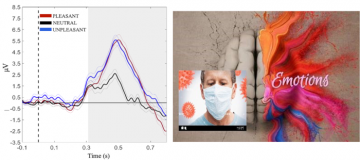
Emotional processing prospectively modulates the impact of anxiety on COVID-19 pandemic-related post-traumatic stress symptoms: an ERP study
Carola Dell’Acqua, Tania Moretta, Elisa Dal Bò, Simone Messerotti Benvenuti & Daniela Palomba
Psychophysiology Lab, Department of General Psychology
The negative impact of Covid-19 pandemic on mental health has been widely described. Particularly, the elevated distress provoked by the pandemic can lead to the development of post-traumatic stress symptoms. Can we identify those that, following an acute stressful event, will develop clinical post-traumatic stress symptoms? The presence of anxiety and depressive symptoms prior to stressful events are known to influence the stress response. Are there factors that moderate the effect of anxiety and depression on the development of post-traumatic stress symptoms? There is a growing interest in examining the role of individual differences in the processing of emotional stimuli in the development of stress symptoms. Given these premises, the psychophysiology lab has conducted a longitudinal study to examine whether the predictive role of anxiety and depression on the development of pandemic-related post-traumatic stress symptoms was modulated by individual differences in the processing of emotional stimuli. Between December 2019 and February 2020, A total of 79 university students completed self-report measures of anxiety and depression along with a passive viewing task of emotional (pleasant and unpleasant) and neutral pictures while electroencephaloghic activity was recorded. After one year, pandemic-related post-traumatic stress symptoms have been assessed with a self-report questionnaire (i.e., the Impact of event scale-Revised, Weiss & Marmar, 1997). Participants that before the pandemic showed higher levels of anxiety symptoms and a greater neural response to unpleasant pictures or lower neural response to pleasant relative to neutral ones, developed greater post-traumatic stress symptoms. These findings suggest that neural response to emotional stimuli may represent a vulnerability factor to the development of distress produced by anxiety and serve as an early indicator of individuals that are at a higher risk to develop stress symptoms following a traumatic event.
Dell’Acqua, C., Moretta, T., Dal Bò, E., Messerotti Benvenuti, S., & Palomba, D. (2022). Emotional processing prospectively modulates the impact of anxiety on COVID-19 pandemic-related post-traumatic stress symptoms: an ERP study. Journal of Affective Disorders 303, 245-254.





